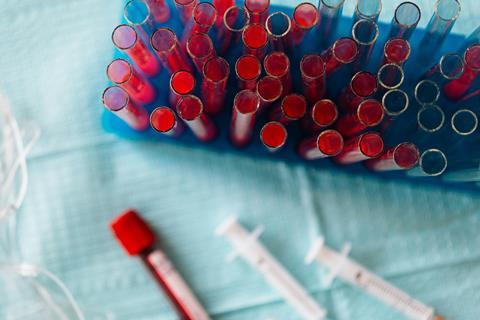UK Biobank has today released the final set of data on nearly 250 metabolites – the molecules in our blood produced by our bodies as we go about our lives – in half a million volunteers. This completes the world’s largest ever metabolomic study, which will help researchers to better predict who is at highest risk of disease and drive treatment strategies for neurological conditions, heart disease and cancer.

After 50,000 hours of measuring metabolites in the blood, including sugars, fats and amino acids, by Nightingale Health, this final release of metabolomic data is now available to UK Biobank approved researchers around the world. These data reflect one part of the many thousands of metabolites circulating in our body; but when combined with UK Biobank’s whole genome sequencing and proteomic data, they add the next piece of the puzzle to help researchers pinpoint the cause of an individual’s disease.
READ MORE: Metabolomics: decoding the chemical language of life
Professor Naomi Allen, Chief Scientist at UK Biobank, said: “Metabolites are small molecules made when the body breaks down the food we eat, air we breathe, and the medicines we take. Examining metabolites bridges the gap between health and disease, allowing researchers to better understand the biological processes that genetic or protein data alone might miss. Studying metabolites is a powerful way to unveil new warning signs of disease, understand how illnesses start and evolve, and track how well treatments are working.”
Scientific discoveries
These metabolomic data have been released to approved researchers in batches since 2021. Research using the existing metabolomic data has already led to scientific discoveries including:
-
A blood test, able to reflect an individual’s risk of developing common diseases including Type 2 diabetes. These risk scores are now used in clinical practice in Finland and Singapore
-
New ways to predict and prevent future heart disease by identifying many thousands of people in the UK over a 10-year period who would benefit substantially from early treatment
-
Understanding how our metabolism and gut microbiome may work together to impact risk of depression
-
‘Metabolomic clocks’, which may give an indication of how our biological age differs to our chronological age, helping us to understand who is at increased risk from poorer health later in life
Professor Sir Rory Collins, Principal Investigator and Chief Executive of UK Biobank, said: “These metabolomic data represent the next link in the chain of UK Biobank’s unparalleled data offering to scientists seeking to improve public health. When combined with the genetic, proteomic and imaging information, these data open up a new dimension of discovery, allowing scientists to study the combined effects of genes, proteins and environmental factors on our health, providing us with new insights into the real-time state of a patient.”
Driving research
Coupled with UK Biobank’s data on health and lifestyle of half a million volunteers, these metabolomic data will drive research into:
-
Risk prediction – metabolomics can complement the use of genetics in predicting future disease, helping to pinpoint those who would benefit most from early diagnostics and preventative treatments
-
Mechanisms of disease – together with the whole genome sequencing data, these metabolomic data can be used to show how genetic changes can impact the levels of certain metabolites, and whether this slows or drives disease progression
-
Drug discovery – identifying metabolic pathways linked to disease provides pharmaceutical companies with an insight into that disease that they wouldn’t have otherwise had, reducing development costs and bringing effective drugs closer to patients
-
Clues into the impact of ageing and the environment – understanding why our organs age at different rates and how environmental factors like air pollution impact health
Galaxy of metabolites
Professor Michael Inouye, Professor of Systems Genomics & Population Health at University of Cambridge, said: “There is a galaxy of metabolites within the body. To have metabolomic data on the scale of UK Biobank, alongside their diverse and growing range of information on half a million volunteers, creates a unique cohort study in which scientists can make discoveries.
“I look forward to working with my team on these new metabolomic data, and I feel confident these data will enhance our ability to identify people at high risk of disease, so that doctors can intervene early to support longer and healthier lives.”
Dr Jeffrey Barrett, Chief Scientific Officer at Nightingale Health, said: “Generating metabolomics data in all half a million individuals in UK Biobank was a flagship project for Nightingale. And having all that data available for the global network of UK Biobank researchers means scientists around the world can uncover critical insights into blood biomarkers and human health and test them in one of the biggest medical research projects in the world. It’s a huge win for everyone.”
A second point in time
For around 20,000 of the 500,000 UK Biobank participants, a second blood sample was also analysed, taken around five years after the first. This extra set of metabolomic data will allow researchers to look at how changes in metabolite levels impact risk of developing a range of chronic diseases, such as heart disease and Type 2 diabetes.
These metabolomic data are available to UK Biobank approved researchers via the UK Biobank Research Analysis Platform (UKB-RAP), and they are part of a wider data release. A full summary of the new and updated data available can be found in our Researcher Community.







No comments yet